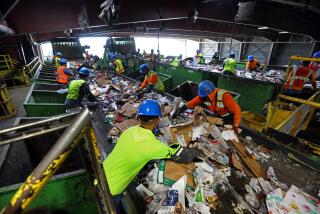Hormone-disrupting chemicals found in water at fracking sites
- Share via
Water samples collected at Colorado sites where hydraulic fracturing was used to extract natural gas show the presence of chemicals that have been linked to infertility, birth defects and cancer, scientists reported Monday.
The study, published in the journal Endocrinology, also found elevated levels of the hormone-disrupting chemicals in the Colorado River, where wastewater released during accidental spills at nearby wells could wind up.
Tests of water from sites with no fracking activity also revealed the activity of so-called endocrine-disrupting chemicals, or EDCs. But the levels from these control sites were lower than in places with direct links to fracking, the study found.
“With fracking on the rise, populations may face greater health risks from increased endocrine-disrupting chemical exposure,” said senior author Susan Nagel, who investigates the health effects of estrogen at the University of Missouri School of Medicine.
Fracking involves injecting millions of gallons of chemical-laced water and sand deep underground to crack shale formations and unlock oil and gas. The process is exempt from some regulations that are part of the Safe Drinking Water Act, and energy companies do not have to disclose the chemicals they use if they consider that information a trade secret.
The study was published as the Energy Information Administration issued a forecast that natural gas production would continue to rise, and gas would overtake coal as the United States’ main source of fuel for power plants. The fact that the domestic boom in oil and gas is driven by fracking has made discussions of its impact extremely fraught.
Nagel and her colleagues tested samples of surface water and groundwater from Garfield County, Colo., which, with its approximately 10,000 wells, is a center of oil and gas development driven by fracking. The research team gathered multiple water samples at five natural gas sites where spills of fracking wastewater had occurred over the last six years, Nagel said.
The team tested for the presence of four different classes of endocrine-disrupting chemicals. Out of 39 water samples collected at five drilling sites, 89% showed estrogenic properties, 41% were anti-estrogenic, 12% were androgenic and 46% were anti-androgenic, according to the report. The samples were not tested for specific fracking chemicals or for concentrations of chemicals.
Water from control sites in Colorado and Missouri where there is no fracking showed some EDC activity, but the levels were lower than in the water samples from the Garfield County sites, according to the study.
The team also tested water samples from the Colorado River. These samples showed the presence of more EDC activity than the control samples, the researchers found.
In another part of the study, researchers conducted laboratory analyses of 12 fracking chemicals that are used in Colorado to extract oil and gas. They found that the chemicals were endocrine disrupters that could interfere with human sex hormones.
Over the last three years, researchers have assessed more than 700 chemicals that could be used in the fracking process and estimated that about 100 are known or suspected EDCs.
Nagel said that although estrogenic substances can be found naturally occurring in water, she did not know of similar sources of anti-estrogenic or anti-androgenic chemicals.
Exposure to EDCs is particularly risky for fetuses, babies and young children, scientists said. Last year, the World Health Organization issued a report raising the alarm on EDCs, saying that endocrine-related illnesses were on the rise worldwide.
Mark Salley, spokesman for the Colorado Department of Public Health and Environment, said his agency had not yet had time to review the study.
But Katie Brown, a spokeswoman with the industry advocacy group Energy In Depth, dismissed the study as “inflammatory.”
Independent scientists who reviewed the study countered that the researchers were cautious with their conclusions. The study does not state that fracking spills contaminated surface and groundwater. Rather, it shows a correlation between the Garfield County spill sites and greater activity of EDCs in the water.
“I’m not an alarmist about this, but it is something the country should take seriously,” Nagel said.
Research into fracking’s possible effects on public health is in its early phase, and Nagel and other scientists said the study was a first step that warranted follow-up work.
“The human endocrine system and that of wildlife is guided by very small fluctuations of hormones,” said Dr. Meg Schwarzman, associate director of the Berkeley Center for Green Chemistry at UC Berkeley. “Even low levels of anti-estrogenic or anti-androgenic activity could potentially alter development in ways that are meaningful.”







